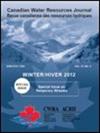Commentary: Prescribed future pathway for Ontario conservation authorities: regulatory impacts and implications
IF 1.7
4区 环境科学与生态学
Q3 WATER RESOURCES
引用次数: 0
Abstract
In our previous Commentary (Mitchell, Shrubsole, and Watson 2021), we examined the role of the conservation authorities (CAs) in Ontario. We considered whether CAs would end or evolve, or reach an interlude or epiphany following changes to their regulatory functions and rules of conduct proposed by the Ontario provincial government. As is common throughout Canada and many other democratic countries, in Ontario members of elected provincial governments have the power to propose new or amended legislation. Such proposals are then scrutinized and debated via provincial parliamentary procedures, resulting in decisions to accept, amend or reject the proposed legislation or regulations. Legislative and regulatory proposals are, in part, about substantive details—in this case, the operation of the CAs. However, such proposals are also about the promotion of political ideas and ideologies—such as the importance of economic development and the balance to be struck against environmental and social concerns, and also views regarding the appropriate organization of government and the use or power. Our previous Commentary covered experience of the CAs from their founding in the mid-1940s until the end of 2020. We noted that the Ontario government in December 2020 had created a Working Group to identify acceptable changes for the future role of conservation authorities. Prior to this, provincial government proposals had been met with a mix of support and opposition from CAs and other organizations with interests in resource conservation and development. The Working Group was directed to provide advice on proposed regulations under the Conservation Authorities Act, and also advice about how conservation authorities are governed, with particular regard to: (1) mandatory core programs and services conservation authorities would provide, (2) agreements between municipalities and conservation authorities and the transition period associated with conservation authorities providing non-mandatory programs and services, and (3) how local members of the community can better participate in their conservation authorities through community advisory boards (Ontario and Environmental Registry of Ontario 2021). In this follow-up Commentary, we examine the position taken by the provincial Conservative Government as expressed in reports published late in 2021 and in January 2022. The details covered in the two reports , and the potential impacts or implications for resource conservation and management in Ontario are considered below.评论:安大略省保护当局规定的未来道路:监管影响和影响
在我们之前的评论(Mitchell、Shrubole和Watson 2021)中,我们研究了安大略省保护机构的作用。我们考虑了在安大略省政府提议改变其监管职能和行为规则后,CA是否会结束或发展,或达到间歇或顿悟。正如加拿大和许多其他民主国家普遍存在的那样,安大略省民选省级政府成员有权提出新的或修订的立法。然后通过省级议会程序对这些提案进行审查和辩论,从而决定接受、修改或拒绝拟议的立法或条例。立法和监管提案在一定程度上涉及实质性细节——在本案中,涉及CA的运作。然而,这些建议也涉及促进政治思想和意识形态,例如经济发展的重要性和与环境和社会问题的平衡,以及关于政府适当组织和权力使用的观点。我们之前的评论涵盖了CA从20世纪40年代中期成立到2020年底的经验。我们注意到,安大略省政府于2020年12月成立了一个工作组,以确定保护当局未来角色的可接受变化。在此之前,省政府的提案遭到了CA和其他对资源保护和开发感兴趣的组织的支持和反对。工作组被指示就《保护机构法》下的拟议法规提供建议,并就如何管理保护机构提供建议,特别是:(1)保护机构将提供的强制性核心计划和服务,(2)市政当局和保护当局之间的协议,以及与保护当局提供非强制性计划和服务相关的过渡期,以及(3)社区的当地成员如何通过社区咨询委员会更好地参与其保护当局(安大略省和安大略省环境登记处,2021年)。在本后续评论中,我们审查了省保守党政府在2021年末和2022年1月发表的报告中所表达的立场。以下考虑了两份报告中涉及的细节,以及对安大略省资源保护和管理的潜在影响或影响。
本文章由计算机程序翻译,如有差异,请以英文原文为准。
求助全文
约1分钟内获得全文
求助全文
来源期刊

Canadian Water Resources Journal
WATER RESOURCES-
CiteScore
2.90
自引率
5.90%
发文量
17
审稿时长
>12 weeks
期刊介绍:
The Canadian Water Resources Journal accepts manuscripts in English or French and publishes abstracts in both official languages. Preference is given to manuscripts focusing on science and policy aspects of Canadian water management. Specifically, manuscripts should stimulate public awareness and understanding of Canada''s water resources, encourage recognition of the high priority of water as a resource, and provide new or increased knowledge on some aspect of Canada''s water.
The Canadian Water Resources Journal was first published in the fall of 1976 and it has grown in stature to be recognized as a quality and important publication in the water resources field.
 求助内容:
求助内容: 应助结果提醒方式:
应助结果提醒方式:


